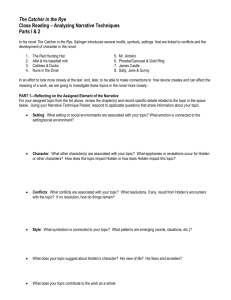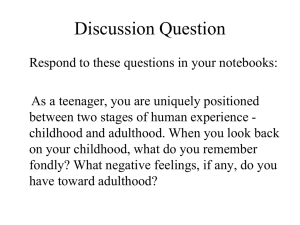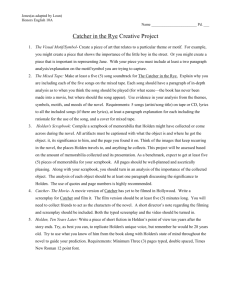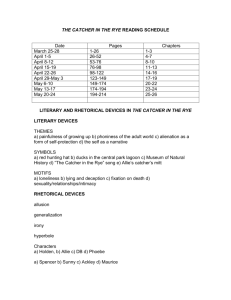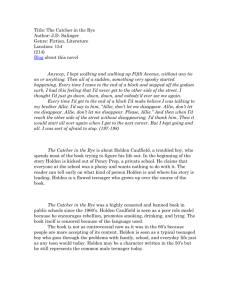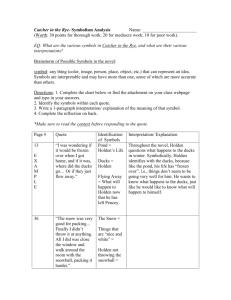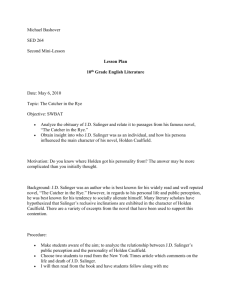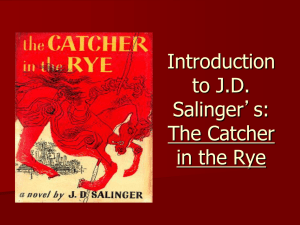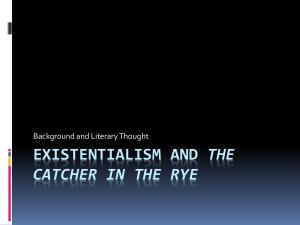The Catcher in the Rye Vocabulary Introduction-Chapters 1-4
advertisement
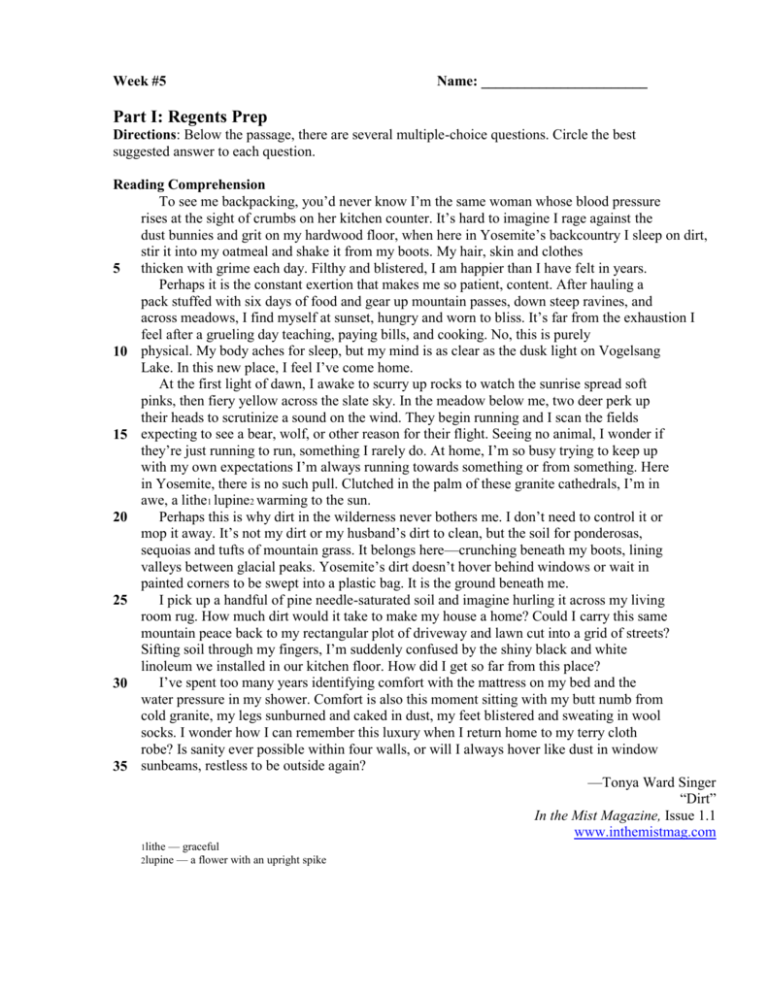
Week #5 Name: _______________________ Part I: Regents Prep Directions: Below the passage, there are several multiple-choice questions. Circle the best suggested answer to each question. Reading Comprehension To see me backpacking, you’d never know I’m the same woman whose blood pressure rises at the sight of crumbs on her kitchen counter. It’s hard to imagine I rage against the dust bunnies and grit on my hardwood floor, when here in Yosemite’s backcountry I sleep on dirt, stir it into my oatmeal and shake it from my boots. My hair, skin and clothes 5 thicken with grime each day. Filthy and blistered, I am happier than I have felt in years. Perhaps it is the constant exertion that makes me so patient, content. After hauling a pack stuffed with six days of food and gear up mountain passes, down steep ravines, and across meadows, I find myself at sunset, hungry and worn to bliss. It’s far from the exhaustion I feel after a grueling day teaching, paying bills, and cooking. No, this is purely 10 physical. My body aches for sleep, but my mind is as clear as the dusk light on Vogelsang Lake. In this new place, I feel I’ve come home. At the first light of dawn, I awake to scurry up rocks to watch the sunrise spread soft pinks, then fiery yellow across the slate sky. In the meadow below me, two deer perk up their heads to scrutinize a sound on the wind. They begin running and I scan the fields 15 expecting to see a bear, wolf, or other reason for their flight. Seeing no animal, I wonder if they’re just running to run, something I rarely do. At home, I’m so busy trying to keep up with my own expectations I’m always running towards something or from something. Here in Yosemite, there is no such pull. Clutched in the palm of these granite cathedrals, I’m in awe, a lithe1 lupine2 warming to the sun. Perhaps this is why dirt in the wilderness never bothers me. I don’t need to control it or 20 mop it away. It’s not my dirt or my husband’s dirt to clean, but the soil for ponderosas, sequoias and tufts of mountain grass. It belongs here—crunching beneath my boots, lining valleys between glacial peaks. Yosemite’s dirt doesn’t hover behind windows or wait in painted corners to be swept into a plastic bag. It is the ground beneath me. I pick up a handful of pine needle-saturated soil and imagine hurling it across my living 25 room rug. How much dirt would it take to make my house a home? Could I carry this same mountain peace back to my rectangular plot of driveway and lawn cut into a grid of streets? Sifting soil through my fingers, I’m suddenly confused by the shiny black and white linoleum we installed in our kitchen floor. How did I get so far from this place? I’ve spent too many years identifying comfort with the mattress on my bed and the 30 water pressure in my shower. Comfort is also this moment sitting with my butt numb from cold granite, my legs sunburned and caked in dust, my feet blistered and sweating in wool socks. I wonder how I can remember this luxury when I return home to my terry cloth robe? Is sanity ever possible within four walls, or will I always hover like dust in window 35 sunbeams, restless to be outside again? —Tonya Ward Singer “Dirt” In the Mist Magazine, Issue 1.1 www.inthemistmag.com 1lithe — graceful 2lupine — a flower with an upright spike 1. The phrase “worn to bliss” (line 8) indicates that at the end of the hike the narrator feels (1) confused and angry (2) sad but hopeful (3) cold and hungry (4) tired but satisfied 2. The narrator’s comments about her own expectations in lines 16 and 17 illustrate that she (1) performs dangerous tasks (2) feels pressured (3) dislikes her job (4) craves attention 3. The wilderness setting in the third paragraph is developed primarily through the use of (1) imagery (3) characterization (2) symbolism (4) personification 4. The narrator indicates that the dirt in Yosemite does not frustrate her because (1) she cleans up her trash (2) no one else is bothered (3) it naturally occurs there (4) it looks unusual 5. Throughout the passage, the narrator implies that she (1) is afraid of wildlife (2) admires neatly mowed lawns (3) wants to sell her home (4) feels content in the wilderness 6. The main purpose of this passage is to (1) narrate a personal journey (2) persuade readers to camp (3) describe the value of exercise (4) explain feelings of insecurity Part II: Literary Techniques in the Catcher in the Rye Stream of Consciousness Below are 3 passages that use the stream of consciousness technique. And the band started playing one of those really slow songs, like "Stairway to Heaven" or "Freebird" that probably have really great lyrics or something but the song itself just is awful-just awful. Then this real phony guy, with the hair all slicked back on the top of his head stood up with the Sax and did a solo. I almost died. I mean, almost completely died right there. It had to be the cheesiest solo I had ever heard. I mean he was swaying back and forth and he closed his eyes like he was really getting into it and all, but it was the fakest thing you ever heard. It was like something out of a bad Howard Johnson's. I swear, he must record Muzak for a living or drive a forklift or something. Old Jean was getting into it, though. She was humming along and swaying to the song and practically just swaying her own dance out there. I mean I'm a pretty good dancer but I hate slow songs. There's nothing you can do except just sit there and hold her and move her around and wait for the song to end. I would have rather just sat down and ordered another drink and waited for something else but not old Jean. She wanted to dance everything. Up real close to, so I could smell her breath. She didn't smell bad or anything. Don't get me wrong, she just didn't smell quite right. I mean girls should smell a certain way-like baby powder, new clothes and perfume. Something that was girlish, y'know. Jean, I swear, smelled like a fruit salad or Old Spice. I hate Old Spice. I mean I like Jean fine, y'know. She's great, but I just couldn't smell her. Christ, I must be nuts. All of a sudden I start to imagine myself as the old sailor in the Old Spice commercial. Right out there on the dance floor. I start to think about coming home from the sea and bringing in the duffel and that song. It must have been the goddammed saxophone because that goddam song is running through my head "Dum dum de dum dum, dum di de dum dum da di dum dum" I see myself coming home to this really cute girl and wearing a sailor suit or something. I'm crazy. I mean, I'm really nuts sometimes. What is similar in each of these passages?____________________________________ ________________________________________________________________________ Based on your observations come up with a definition: I think stream of consciousness means ______________________________________ ________________________________________________________________________ Part III: SAT—Part or all of each sentence is underlined; beneath the sentence are five ways of phrasing the underlined material. Select the option that produces the best sentence. If you think the original phrasing produces a better sentence than any of the alternatives, select choice A. 1. In Costa Rica, coffee, from the highlands, and bananas, produced mainly in the Caribbean lowlands, as the most important crops, they account for nearly half the total value of all exports a. as the most important crops, they account b. as the most important crops, which account c. are the most important crops, accounting d. are the most important of their crops by accounting e. have been the most important crops, which accounts 2. Digital technology, like every marketer knows, it is synonymous with speed, precision, and the future. a. technology, like every marketer knows, it is b. technology, similar to what every marketer knows as c. technology, as every marketer knows, is d. technology is what every marketer knows as e. technology that every marketer knows is 3. With the 1977 publication of Song of Solomon, Toni Morrison both received popular and critical acclaim. a. both received popular and b. both received popular and also c. received popular, along with d. received popular as well as e. received both popular and also Part IV: Nonfiction 58 years after the story about a disaffected teenager was published, why is it still so powerful to so many people? Holden Caulfield, (the main character in The Catcher in the Rye) does not like a lot of what he encounters. Much is dopey, corny, lousy, crumby, vomity but most of all, phoney. Holden is surrounded by phoneys, almost wherever he goes. It's almost enough to make him puke. And yet this story of a couple of days in the life of a teenager has sold tens of millions of copies since its release. There are not many other novels from the 1950s that can be found persistently hovering around the top 100 bestseller lists. Rise of teenager Fans of the novel regard it as the defining work on what it is like to be a teenager. Holden is at various times disaffected, disgruntled, alienated, isolated, directionless, and sarcastic. The book's publication in 1951 came at the dawn of the age of the teenager. A new social category, newly economically empowered and hungry for culture, was fed by music, films and novels. "It absolutely speaks to that moment the teenager emerges as a recognizable social group," says Dr Sarah Graham. "Before that people went through their teenage years with no sense it was a particular kind of identity. It is the first novel of the modern teenage years." The fact that teenagers were all in high school for the first time, instead of working and providing for their family from an early age, gave them time to think. And to mope. "Leisure gave teenagers time to reflect on where they were going," says Dr Graham, of Leicester University. "The idea of existential angst in some way draws from Catcher in the Rye as much as the novel reflects it. There is a strong dialogue between the book and the teenage experience - they are mutually shaping." School controversy But The Catcher in the Rye wasn't written for the audience that has embraced it most wholeheartedly. "It was never written for a teenage audience, it was written for adult readers," says Dr Graham. "There's been so much controversy over the years with it being offered to high school students. From the 1950s there are cases of teachers losing their jobs for setting the book." Whatever the intended audience, Salinger's work has become a Based on just the first 2 paragraphs, why do you think The Catcher in the Rye sold millions? According to Graham, what is significant of the timing of the novel’s release? “lucrative”-We have seen this vocabulary word before. Define and explain what it means here. classic of one of publishing's most lucrative genres - teen fiction. And a thousand authors have tried to capture the spirit of Holden Caulfield. But despite its gazillions of sales, there are plenty of people teenage and adult - who just cannot understand what the fuss is about. "The moaning, dreary I-like-the-sound-of-my-own-voice tone with which Caulfield told his short story started to really get on my nerves," says one. Another concludes: "It's like reading a diary written by a spoiled, annoying, Emo teenager - self indulgent, repetitive and likely to leave you wanting to just slap the narrator while saying 'for God's sake, get over yourself'." Many of these readers are disappointed that the novel fails to meet the expectations generated by the mystique it is Explain what this shrouded in. JD Salinger has done his part to enhance this paragraph means. mystique. That is to say, he has done nothing. Salinger's most famous achievement is writing The Catcher in the Rye, but his second most famous achievement is several decades of seclusion. He is a man who only reminds the world of his extant status by occasional forays into legal action against copyright infringers. There can be few works of The Catcher in the Rye's stature that have avoided a Hollywood adaptation. The notoriety of the novel is also enhanced by something far darker - that John Lennon's killer Mark David Chapman was completely obsessed by the work, and was reading it when arrested. Whatever its reputation, Salinger's novel now enjoys a status as something passed from adults to teenagers, and from teenager to teenager. Explain what this Teenage everyman paragraph means. Adults give it to teenagers hoping they will be reassured that having a train of misanthropic and cynical thoughts parading through their mind is entirely normal, perhaps even desirable. Those who embrace the novel recognize Holden as a teenage everyman. Dr Graham suggests it is unique, "the way in which a young affluent white male has come to stand for a universal experience of adolescence". Holden feels uncomfortable about all the things that adults have learnt to inure themselves to. Holden can't bear to see people with cheap luggage - it becomes a symbol of a society where money is all. He hates the school headmaster who will not speak to the funny-looking parents. Holden hates everything that pretends to be authentic. And what do adults re-reading it in 2009 get? Perhaps they hope to recapture something of the way they thought when they were a teenager.
